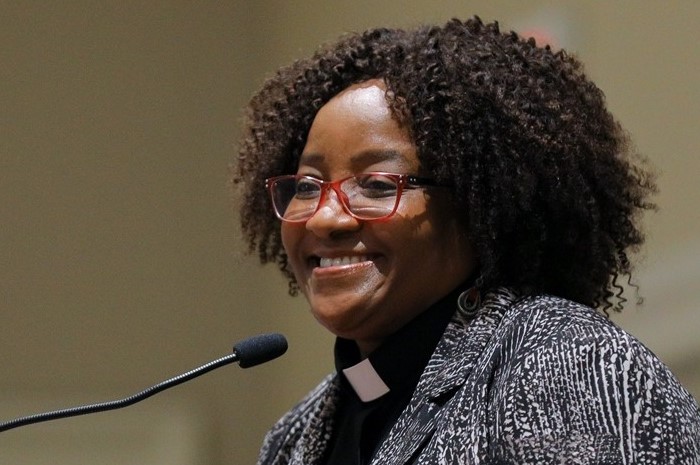Black Motherhood in the US Today

On the sixth anniversary of Trayvon Martin’s murder, the Rev. Naomi Tutu shares a raw piece filled with the ache of Black motherhood in the US today.
For the last few years, I have found myself struggling with the wilderness experience of Hagar. Hagar—given by Sarah to have sex with her husband Abraham and bear them a child. Hagar—fleeing into the wilderness from Sarah’s wrath when Sarah decides she is getting uppity. Hagar—told to return by God, only to be banished into the wilderness to die with her child once Sarah gives birth. It is this wilderness experience that feels familiar to me as a Black woman in the United States today.
My formative experiences were all about the strength of women’s solidarity. I was weaned on the story of the Women’s March in Pretoria—a march led by women from all South Africa’s rainbow of races, with the slogan, “You have struck the women, you have struck a rock.” I came to age with the story of Betty Williams and Mairead Maguire bringing together the women of Northern Ireland, pushing a movement for peace. I celebrated the women of Liberia coming together, under the leadership of Leymah Gbowee, women of all ethnic groups, of all religions, to bring an end to that country’s civil war. Women shared something, I believed—a care for the children, whether we birthed them or not.
Yet, over the last few years as I witness the stories of Black women and men, Black girls and boys, killed by police, abused and beaten by those meant to protect them, I have experienced Hagar’s wilderness. My children are not seen as children, even by other women; rather they are seen as threats deserving of any abuse. I looked at my son and wept as the verdict came from the murder of Trayvon Martin, because I knew that those women could not see him as one the 16 year-olds they knew—a teenager doing exactly what all parents teach their children to do if accosted by a stranger: scream and fight so that people will help you.
I experienced Hagar’s banishment at a gathering of women a few years ago. As part of the gathering, this group of predominantly white women held a time of mourning for Mother Earth and all that ails Her. As I watched the group moan and sway and even weep, I felt myself in the wilderness. I thought, how can we be moaning and weeping for the pain that is felt by the Earth and her children in the comfort of a hotel ballroom? Why can’t this weeping and solidarity be shown at the places and times where our Black children are abused and killed?
The wilderness I live in day after day is Hagar’s, knowing my children are seen as Sarah saw Ishmael: a threat, not children deserving of care and protection. Knowing that those who abuse or even kill them will always be given the benefit of the doubt. My wilderness experience is wondering when we will all be seen as fully human, wandering in search of the Beloved Community.
The Rev. Naomi Tutu will speak in San Diego on Thursday, March 21.
The challenges of growing black and female in apartheid South Africa have been the foundation of Naomi Tutu’s life as an activist for human rights. Those experiences taught her that our whole human family loses when we accept situations of oppression, and how the teaching and preaching hate and division injure us all. Her path to ordination has been one of struggle and wrestling with what a call to the priesthood means in our very divided world. The Rev Tutu serves as curate at Christ Church Cathedral, Nashville, and was ordained an Episcopal priest on December 16, 2017. She is the mother of Tebogo, Mungi and Mpilo.